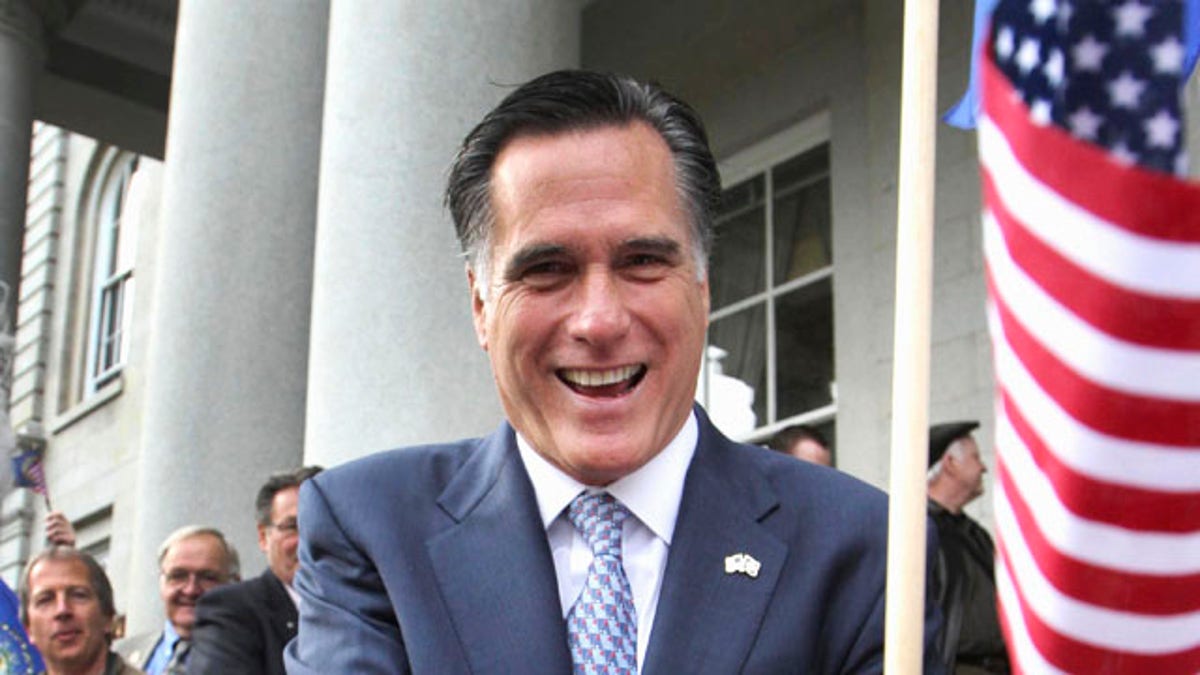
FILE - In this Oct. 24, 2011 file photo, Republican presidential candidate, former Massachusetts Gov. Mitt Romney greets supporters outside the State House in Concord, N.H. (AP Photo/Jim Cole, File) (AP2011)
The Iowa Caucus proved one thing for certain: Mitt Romney is still the GOP candidate to beat. While Rick Santorum rode a stunning surge in the caucus, Romney still came out first (if only by eight votes). The former Massachusetts governor has run a highly disciplined and well-oiled campaign that, though solid, has yet to catch fire with the GOP primary voting public. From his stance on gun control, to his positions on health care and immigration, Romney has drawn criticism from both the right and the left for supporting radically different policies at different moments of his political life. Fox News Latino has compiled a list of some issues key to the Hispanic vote and where Mitt Romney stands.
Immigration
Romney’s stance toward immigration can be described as evolving. He has been criticized for changing his mind on what to do about undocumented immigrants living in the U.S., sometimes arguing for a path to citizenship and at other times calling that amnesty. In a 2006 interview with Bloomberg, Romney sat in the middle saying “we need to begin a process of registering those people, some being returned and some beginning the process of applying for citizenship and establishing legal status.”
Currently, however, Romney strongly opposes any any immigration reform that leads to a path to legal status or citizenship, regardless of how long an undocumented immigrant has spent living in the country, whether they have American citizen family members or dependents, and their behavior and accomplishments.
Over the weekend while campaigning in Iowa, Romney also said that he strongly opposed the DREAM Act --proposed legislation that would legalize the status of people brought to the country as minors and were either attending college or enlisted in the military-- and would veto any legislation that gives "dreamers" a path to citizenship. While he said before that he opposed the legislation, the comment made on Saturday was the first time he explicitly said that he would veto it.
Like many of this fellow GOP hopefuls, Romney is also opposed to the idea of sanctuary cities --localities that refuse to share local police information with a federal immigration database.
Border Security
Romney is in the camp that believes that Islamist extremist groups are using Mexico and the rest of Latin America as a staging ground for attacks on the United States. "We have, right now, Hezbollah, which is working throughout Latin America, in Venezuela, in Mexico, throughout Latin America, which poses a very significant and imminent threat to the United States of America,” he said during a recent debate.
Romney ties the idea of border security to the immigration and is a supporter of a fence between the U.S. and Mexico. He's also a proponent of the government’s E-Verfiy system, which makes employers certify that their workers are legally allowed to work in the U.S. “I am in favor of building a fence and having a secure border. I am in favor of electronic verification system. The big debate is those who have already came here illegally,” Romney said back in 2007, according to IowaPolitics.com.
Economy
In September of last year Romney introduced his economic plan that argues the best way to revive the economy is to get the government to stay out of the way of corporations. The Bain Capital co-founder highlighted overhauling federal tax, regulatory, trade and energy policies and also took tough stances on China and labor unions. His plan wants to increase trade, energy production, human capital, and labor flexibility.
“It is at once a deeply conservative return to policies that have served our nation well and a highly ambitious departure from the policies of our current leadership. In short, it is a plan to get America back to work,” Romney’s website said.
Healthcare
Romney said that if he was elected he would immediately work to repeal the national healthcare legislation passed in 2010,also known as Obamacare, and replace it with market-based reforms. He said that this would empower states and individuals and reduce health care costs.
As Massachusetts governor, Romney signed into law a private, market-based reform that ensures the state’s citizens will have health insurance and in 2007 he revealed his national health care plan that would allow states to choose individual health care plans for their fellow citizens.
Speaking specifically about Obamcare, Romney has said that it “is unhealthy for America. It raises taxes, slashes the more private side of Medicare, installs price controls, and puts a new federal bureaucracy in charge of health care. It will create a new entitlement even as the ones we already have are bankrupt. For these reasons and more, the act should be repealed. That campaign begins today,” he said, according to Forbes.
Romney acknowledges that his plan is not perfect, but highlighted that it received bipartisan support, while Obama’s plan had no Democratic backing.
Where Rick Perry Stands on Latino Issues
Where Rick Santorum Stands on Latino Issues
Where Jon Huntsman Stands on Latino Issues
Where Ron Paul Stands on Latino Issues
Where Newt Gingrich Stands on Latino Issues
Follow us on twitter.com/foxnewslatino
Like us at facebook.com/foxnewslatino












































